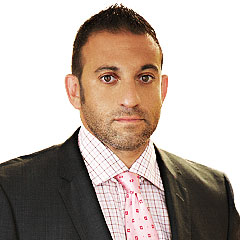
Childhood injuries are all too common, in Clearwater and throughout the United States. Child injuries cause pain and trauma to your child. If the injuries are serious or catastrophic, your child's entire life can be affected. A catastrophic injury is one in which people can no longer perform the activities of daily living, such as getting dressed, and may need special accommodations to attend school and to accomplish other functions. If your child is injured due to the fault of someone else, you do have recourse to help you and your child. Contact the child injury lawyers at Dolman Law Group Accident Injury Lawyers, PA for a free consultation on the case. We fight for the rights of the injured.
What Are The Most Common Child Injuries?
Motor vehicle accidents involving children result in 150 visits to emergency departments every hour nationwide; and they are only one of the potential dangers children are exposed to. Unfortunately, many things injure or otherwise harm these children. Injuries can occur on their way to and from school, at school, at sporting events and practices, in private homes, at theme parks or other amusements, in daycare, and playing or walking around in their neighborhoods. The six most common childhood injuries are:
- Motor vehicle accidents - Children can suffer injuries from cars, trucks, school and other buses, bicycles, motorcycles, and other vehicles (as passengers and as pedestrians). Motor vehicle accidents are the single most common cause of childhood injuries in the United States.
- Suffocation or choking - Suffocation or choking is especially prevalent in very small children, who may swallow objects without realizing the danger. Children can also suffocate or choke because they are in potentially dangerous situations without adequate supervision or are otherwise placed in those situations. Even pillows or car seats can pose suffocation dangers if the children are not supervised, or if the objects are not the correct size for the child.
- Drowning - According to U.S. government statistics, approximately 3 children drown every day across the United States, on average. Drowning may pose more than an average danger to children in Florida because of the high number of natural bodies of water (oceans, rivers) and the relatively high number of private swimming pools.
- Poisoning - Approximately 300 children visit emergency departments across the country every day for episodes of poisoning. Many common household chemicals and other substances are poisonous if ingested. These substances can also be found in schools and other institutions.
- Burns - Burns cause enough injuries across the nation to bear responsibility for 300 visits to emergency departments daily nationwide. Burns can arise from fires or coming into contact with hot substances, such as steam, irons, and boiling water
- Falls - Falls pose a huge danger to children. In fact, falls are the single largest cause of non-fatal injuries to children. Roughly 8,000 emergency department visits daily stem from childhood falls. Babies can fall off changing tables and beds; toddlers can tumble down stairs and out of windows; and older children can fall from play equipment, down stairs, or from sports equipment, such as diving boards.
Common Causes of Child Injuries
Some injuries are part of childhood. Nearly everyone has fallen off a bicycle at some point in their childhood, or suffered a bee sting. But unfortunately, all too many child injuries arise from negligence. Negligence is a failure to exercise the proper standard of care. Small children, for example, need the proper level of supervision, or they can run into traffic, fall into swimming pools or get into water too deep for their skill level, swallow objects, stick their fingers into electrical sockets, and get into other dangerous situations. If children are in school or at camp, the institutions owe a duty of care to their students, to provide a safe environment and proper supervision. Employees of the institutions must receive training to provide a safe environment and proper supervision. Drivers of motor vehicles owe a duty of care to all the public; to operate their vehicles according to the law, safely and prudently. They need to take special care around schools and neighborhoods where children are playing. Childminders and caretakers must provide a safe environment and proper supervision, whether they are working in a private home or an institution such as a daycare. Workers in these places need thorough training, background checks, and supervision. In short, the ultimate causes of childhood injury are often the following:
- Negligent supervision
- Improper supervision
- Negligent vehicle operation
- School accidents
- Daycare accidents
- Improper training or supervision from people with specific responsibility for children, such as school bus drivers, teachers, daycare aides, and childminders.
- Dangerous situations or negligence on the part of private property owners, such as dog bites or attacks by insufficiently restrained animals
- Child neglect
- Child abuse
Do your family members, friends, and neighbors owe a duty of care to children? To some degree. No adult should harm or endanger a child, certainly. But generally, people in these categories owe no specific duty of care to monitor the child for safety and ensure their safety and wellbeing in everyday life. This duty of care generally applies only to parents and family members, who should take care to keep their children safe and supervised.
Premises Liability and Children

In Florida, owners of businesses and private homes do owe a duty of care, and children occupy a special category in the law. Premises liability law deals with safety on properties (malls, stores, private homes, and the like). Premises liability depends on the relationship of the premises owner to the public. The first category is invitees. Businesses open to the public are subject to the highest standard. Businesses must always be safe for the public, who are legally termed “business invitees.” If damage or an accident renders the premises unsafe, owners (or their designees, such as managers and employees) must take steps to fix the damage and make it safe again. Their discovery of unsafe conditions falls under the “prudent person” standard. The premises are unsafe if a reasonably prudent person knows or should have known it was unsafe. In other words, a store owner stacking heavy boxes unevenly and haphazardly cannot claim they did not know it was dangerous if the boxes topple and hurt a child. Most reasonable people are aware that haphazardly stacked boxes are potentially dangerous. The second category is licensees. Licensees are people specifically invited onto private premises for some purpose, such as socializing. The property owner owes a lesser duty of care than business owners owe to business invitees. Property owners must try to keep their property safe for licensees. If there are any known hazardous areas, property owners should warn visitors. The final category is trespassers on private property. Trespassers are anyone on private property without invitation, from burglars to children taking a shortcut on their way home from school. Trespassers are generally owed no specific duty of care under Florida law. But, there are three important exceptions.
- First, if a homeowner knows that people often trespass on the property, they should make the area of trespass safe. In other words, if children are known to cut across a corner of a neighbor's yard, the neighbor's failure to keep the area safe may constitute negligence.
- Second, Florida homeowners cannot intentionally harm or try to harm trespassers.
- Third, and perhaps most important from the child injury standpoint, children are accorded a special place in Florida premises liability law, under the Attractive Nuisance Doctrine.
The doctrine recognizes that children are often drawn to private property by something that excites their curiosity or entices them. Children may want to see and play in a neighboring swimming pool, for example. They may feel enticed by an open fire pit. Children can see a wooded area as an exciting place to explore. They may not fully understand the concept of private property or the dangers posed to themselves. As a result, owners of private property must, under the Attractive Nuisance Doctrine, make potential attractive nuisances blocked away from or safe for all children. A homeowner with a swimming pool should make provision so that trespassing children cannot fall into it and drown. They may have to build a fence around it or complete additional measures as necessary.
Who Is Responsible if My Child Is Injured?
If your child is injured, you need to know who (or what) bears responsibility for the injury. Any individual or organization who owes your child a duty of care is potentially negligent if they violated the standard of care. Examples of potentially negligent actors and situations abound in the life of a child.
- School districts that failed to provide an adequate escape in case of fire are potentially negligent if a school fire injures your child.
- Amusement parks are potentially negligent if your child was hurt when a Ferris Wheel malfunctioned.
- Daycare employees are potentially negligent if they failed to adequately supervise a small child who swallowed an object.
- Your next-door neighbor is potentially negligent if they have a swimming pool and take no steps to ensure the safety of curious neighborhood children.
- Drunk drivers are potentially negligent if they cause a traffic accident that injures your child.
Negligent parties become financially responsible for injuries and other harm their negligence causes, as long as the injuries stem directly from a situation that the negligence caused to occur (and not another cause).
Damage Compensation if Your Child Is Injured
If your child suffers injuries, you can approach the negligent party to seek payment for specific compensable harm, such as medical bills. In Florida, compensable damages include the following.
- Medical bills, current and future, for emergency transport and treatment, doctor's visits, hospitalization, surgery, diagnostic services, prescription medication, assistive devices, and more.
- Lost income, if your child's injuries necessitate a parent taking time off from work
- Personal property, for personal property damaged or lost
- Pain and suffering, for physical, mental, or emotional pain and suffering
You can seek damage compensation for compensable harm from either the negligent party's insurance company or from the negligent party themselves via a Clearwater child injury case in civil court. These can occur separately or sequentially. A court case is often a good strategy to get just compensation for an insurance company that refuses to settle fairly. In some cases, the court can also impose punitive damages on the negligent party. Punitive damages punish the wrongdoer for extreme harm of a chronic or particularly egregious nature. A company that manufactures a toy that routinely explodes and injures children all over Clearwater may, for example, become the object of punitive damages. While people can seek compensable damages, they cannot actively seek punitive damages. The court imposes them.
How a Lawyer Can Help You

Pursuing compensation and redress for childhood injuries can pose complications, as more than one party may bear negligence. In addition, insurance companies often try to pay less than an injury is worth. Lawyers can help in multiple ways. They can investigate cases to discover how and why an injury occurred, so the negligent party is known. They can help you determine the appropriate level of compensation to seek. They can negotiate with insurance companies and counter the strategies insurers use to low-ball or minimize claims. Contact Dolman Law Group Accident Injury Lawyers, PA for more information about the legal rights of you and your child.
If Your Child Is Injured in Clearwater, Call Us Now
It is perfectly natural to feel distressed if your child is injured or harmed due to the fault of someone else. Seeing an experienced child injury attorney can help. Lawyers at the Dolman Law Group Accident Injury Lawyers, PA have years of experience obtaining just damage compensation for the victims of childhood injuries. Our first consultation is free. With offices across both Florida coasts, you can easily reach Dolman Law Group Accident Injury Lawyers, PA, and Dolman Law Group Accident Injury Lawyers, PA, at 833-552-7274 (833-55-CRASH), or you can write to us using our online contact page.
Dolman Law Group Accident Injury Lawyers, PA
800 N Belcher Rd
Clearwater, FL 33765
Phone: (727) 451-6900